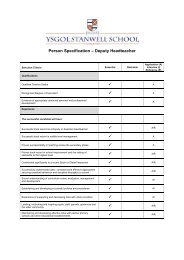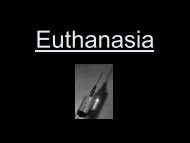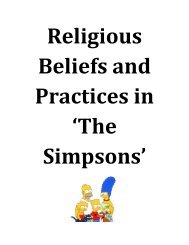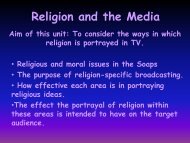Christianity: the arguments against Euthanasia
Christianity: the arguments against Euthanasia
Christianity: the arguments against Euthanasia
Create successful ePaper yourself
Turn your PDF publications into a flip-book with our unique Google optimized e-Paper software.
<strong>Euthanasia</strong>
Definitions of <strong>Euthanasia</strong><br />
<strong>Euthanasia</strong>: The intentional killing by act or<br />
omission of a dependent human being for his<br />
or her alleged benefit.<br />
Voluntary euthanasia: When <strong>the</strong> person who is<br />
killed has requested to be killed.<br />
Non-voluntary: When <strong>the</strong> person who is<br />
killed made no request and gave no consent.<br />
Assisted suicide: Someone provides an<br />
individual with <strong>the</strong> information, guidance, and<br />
means to take his or her own life with <strong>the</strong><br />
intention that <strong>the</strong>y will be used for this<br />
purpose.
Some viewpoints about<br />
<strong>Euthanasia</strong>:<br />
Which of <strong>the</strong> two viewpoints do you agree with?<br />
Write both of <strong>the</strong> viewpoints down and say (1) why<br />
you agree or disagree, and (2) whe<strong>the</strong>r <strong>the</strong><br />
argument seems to be based on some sort of<br />
religious conviction.<br />
(1) Many people in Britain are in favour of euthanasia<br />
because <strong>the</strong>y feel that, as a free country, we as<br />
„free individuals‟ have <strong>the</strong> right to decide for<br />
ourselves when to end our life.<br />
(2) When humans take it upon <strong>the</strong>mselves to shorten<br />
<strong>the</strong>ir lives, or have o<strong>the</strong>rs do it for <strong>the</strong>m, by<br />
withdrawing life-sustaining treatment or give lifeterminating<br />
treatment, <strong>the</strong>y are actually playing God.
A doctor, seeing his eighty-seven year old fa<strong>the</strong>r suffering from terminal<br />
cancer of <strong>the</strong> prostate, injected an overdose of Morphine and<br />
Thiopental, causing his fa<strong>the</strong>r's death within seconds. The court<br />
charged <strong>the</strong> man as guilty of murder because '<strong>the</strong> law is clear that it<br />
none<strong>the</strong>less constitutes <strong>the</strong> crime of murder, even if all that an accused<br />
had done is to hasten <strong>the</strong> death of a human being who was due to die<br />
in any event'. In spite of this charge, <strong>the</strong> court simply imposed a nominal<br />
sentence; that is, imprisonment until <strong>the</strong> rising of <strong>the</strong> court (probably<br />
about one or two hours at <strong>the</strong> most).<br />
Do you think that this is right? After <strong>the</strong> initial shock of someone taking<br />
ano<strong>the</strong>r person‟s life, <strong>the</strong> issue of whe<strong>the</strong>r it was <strong>the</strong> most humanitarian thing<br />
to do still remains.<br />
Your Task: Summarise <strong>the</strong> Case Study into about three sentences (keep<br />
it in <strong>the</strong> box to make it stand out) and <strong>the</strong>n give your opinion. Think<br />
about it carefully and think about <strong>the</strong> motivations of <strong>the</strong> act, not just <strong>the</strong><br />
value of <strong>the</strong> act itself.
Real Life Examples: Diane Pretty<br />
• Suffered from motor neurone disease.<br />
• She was incapable of ending her life due<br />
to her illness.<br />
• She wanted her husband to help her die<br />
but could have faced 14 years in jail.<br />
• She went to <strong>the</strong> High Court in England<br />
but her plea was rejected.<br />
• She went to <strong>the</strong> European Court of<br />
Human Rights in Strasbourg. She was<br />
rejected here as well as it was <strong>against</strong><br />
human rights.<br />
• She died on <strong>the</strong> 11 th May in 2002 of<br />
natural causes.
Real Life Examples: Dan James<br />
A 23-year-old rugby player who was left<br />
paralysed when a scrum collapsed.<br />
Though in need of 24-hour care, Daniel had not<br />
been suffering from a terminal disease.<br />
He could not move from <strong>the</strong> chest down and lost<br />
<strong>the</strong> use of all his limbs. Unable to make <strong>the</strong><br />
enormous mental adjustment from robust athlete<br />
to tetraplegic, he became convinced that he<br />
wanted to end his life. His condition, however,<br />
meant that he could not commit suicide, unless he<br />
chose <strong>the</strong> long and painful horrors of starvation.<br />
Instead, he wanted help.<br />
He died after travelling to a Swiss euthanasia<br />
clinic with his parents in March 2007.
Give me five!<br />
Things you<br />
have learnt<br />
today about<br />
euthanasia
Which type of euthanasia is involved?<br />
Look at <strong>the</strong> following examples and decide whe<strong>the</strong>r <strong>the</strong>y would involve<br />
voluntary or non-voluntary euthanasia and also whe<strong>the</strong>r <strong>the</strong>y involve<br />
active or passive euthanasia:<br />
a) A man who is in pain caused by a terminal disease asks his doctor<br />
for a lethal injection to end his pain.<br />
b) A child is born with a severe disability and is incapable of feeding<br />
herself. The parents ask for her not to be fed.<br />
c) A woman who is in hospital dying from a terminal disease asks not<br />
to be given food or water.<br />
d) A man is in a permanent vegetative state and his family and doctors<br />
decide it would be best if he were given a lethal injection.
Complete <strong>the</strong> grid and say why <strong>the</strong> person should<br />
or should not decide if euthanasia is <strong>the</strong><br />
appropriate option (e.g. The person in pain may<br />
not be conscious, <strong>the</strong> next of kin might not know<br />
what is <strong>the</strong> right thing to do etc.). Consider <strong>the</strong><br />
quote below this box too!<br />
"Abandonment of Hope"<br />
Every doctor can tell stories of patients expected to die<br />
within days who surprise everyone with <strong>the</strong>ir<br />
extraordinary recoveries. Every doctor has experienced<br />
<strong>the</strong> wonderful embarrassment of being proven wrong in<br />
<strong>the</strong>ir pessimistic prognosis. To make euthanasia a<br />
legitimate option as soon as <strong>the</strong> prognosis is<br />
pessimistic enough is to reduce <strong>the</strong> probability of such<br />
extraordinary recoveries from low to zero.
Is <strong>Euthanasia</strong> Suicide?<br />
11%<br />
39%<br />
50%<br />
yes<br />
no<br />
maybe
Are Those Who Commit It<br />
Murderers?<br />
13%<br />
17%<br />
yes<br />
no<br />
maybe<br />
70%
Should <strong>Euthanasia</strong> Be Legalised?<br />
14%<br />
yes<br />
23%<br />
63%<br />
no<br />
maybe
What Do Doctors Think Of<br />
<strong>Euthanasia</strong>?<br />
Two thirds of doctors are <strong>against</strong> <strong>the</strong><br />
legalisation of euthanasia and physician<br />
assisted suicide.<br />
Only 34% of <strong>the</strong> 3,700 doctors asked<br />
supported euthanasia – compared to 82%<br />
of <strong>the</strong> general public.<br />
Only 35% think <strong>the</strong>y should be allowed to<br />
give <strong>the</strong>ir patients <strong>the</strong> means to kill<br />
<strong>the</strong>mselves.
Laws around <strong>the</strong> world<br />
• There are few countries around <strong>the</strong> world<br />
in which euthanasia is legal.<br />
• There are just 4 countries in Europe where<br />
it is: Belgium, Ne<strong>the</strong>rlands, Switzerland<br />
and Luxembourg
What is <strong>the</strong> law in Britain at <strong>the</strong><br />
moment?<br />
• At present, all forms of euthanasia are illegal in<br />
Britain.<br />
• Suicide is legal but assisted suicide is not.<br />
• This is to dissuade people as this is not morally<br />
accepted in this country.
Human Rights<br />
These are <strong>the</strong> rights which each individual has and that<br />
are relevant to <strong>the</strong> case of euthanasia.<br />
In <strong>the</strong> European convention on human rights:<br />
• Article 2: Protection on life.<br />
• Article 3: Freedom from inhuman treatment.<br />
• Article 5: Right to liberty and security of person.<br />
• Article 6: The right to a fair public hearing.
Cases In The Media That You<br />
Might Know<br />
On television:<br />
• Dot and E<strong>the</strong>l in “EastEnders”.
The Consequences
Consequences of <strong>Euthanasia</strong><br />
• The majority of bereaved family and friends who<br />
have lost loved ones through <strong>the</strong> means of<br />
euthanasia are able to cope with grief and posttraumatic<br />
stress reactions better, in comparison<br />
to those who die due to <strong>the</strong>ir illness.<br />
• However, an unnatural death is able to cause<br />
severe grief reaction amongst those close.<br />
• Family members in euthanasia cases have <strong>the</strong><br />
opportunity to say goodbye, whereas this is very<br />
rare in suicide cases.
“A slippery slope”?
Weighing Up<br />
The<br />
Arguments<br />
For<br />
Against
Task:<br />
Write out <strong>the</strong> questions and give FULL answers.<br />
1. What does <strong>the</strong> word euthanasia mean?<br />
2. List each of <strong>the</strong> methods of euthanasia and write a brief<br />
description of what it means.<br />
3. What is <strong>the</strong> Hippocratic Oath?<br />
4. Do you think it is fair to expect a doctor or nurse to assist<br />
in euthanasia? Give <strong>the</strong> reasons for your answer.<br />
5. Write down what you think are <strong>the</strong> five most important<br />
<strong>arguments</strong> FOR euthanasia and write down <strong>the</strong> most<br />
important five AGAINST euthanasia.<br />
6. What would a strict Christian think of euthanasia and why?<br />
7. Do you think certain kinds of euthanasia are ethically<br />
better than o<strong>the</strong>rs? Why?
Religious Views
Unscramble <strong>the</strong> key terms:<br />
tgfi ofmr odg<br />
pohesci<br />
dsearc<br />
otrcare<br />
egmia fo<br />
dog<br />
yitctsna fo ilef<br />
Now write a sentence linking <strong>the</strong>se 6 terms to explain a basic<br />
Christian teaching about euthanasia
<strong>Christianity</strong>: <strong>the</strong> <strong>arguments</strong> <strong>against</strong><br />
<strong>Euthanasia</strong><br />
Life is a gift from God that should not be destroyed.<br />
One of <strong>the</strong> 10 Commandments is : “Thou shall not kill”.<br />
God is in everyone and every living thing. If you harm a<br />
living thing, you harm God.<br />
St. Paul stated ‘Do you not know that your body is a<br />
temple of <strong>the</strong> Holy Spirit’ (1 Corinthians 6:19). This also<br />
implies that we should not destroy ourselves, as all life<br />
contains God’s Holy Spirit.<br />
Job refused to take his own life, arguing that we must<br />
accept suffering as we accept happiness and joy. We<br />
are free to find meaning, even in <strong>the</strong> midst of our<br />
troubles. Suffering is an opportunity for spiritual<br />
growth.
Biblical Quotes
The Teaching Of The Roman<br />
Catholic Church<br />
Those whose lives are diminished or weakened deserve special<br />
respect. Sick or handicapped persons should be helped to lead lives<br />
as normal as possible. Whatever its motives or means, direct<br />
euthanasia consists in putting an end to <strong>the</strong> lives of handicapped,<br />
sick or dying persons. It is morally unacceptable.<br />
However, discontinuing medical procedures that are burdensome,<br />
dangerous, extraordinary, or disproportionate to <strong>the</strong> expected<br />
outcome, can be legitimate; it is <strong>the</strong> refusal of over-zealous<br />
treatment.<br />
(2276-2277)- These numbers refer to paragraphs in The Catholic Catechism
“<strong>Euthanasia</strong> is a grave violation of <strong>the</strong> law<br />
of God, since it is <strong>the</strong> deliberate and<br />
morally unacceptable killing of a<br />
human person."<br />
Pope John Paul II
<strong>Christianity</strong>: The argument for<br />
<strong>Euthanasia</strong><br />
Christians respect all living things, so if someone wants<br />
to end <strong>the</strong>ir life that wish should also be respected.<br />
Some argue that Jesus commanded us to show<br />
compassion – “Love one ano<strong>the</strong>r as I have loved you.”<br />
(John 13:34)<br />
Some may argue that <strong>the</strong>y are fulfilling <strong>the</strong><br />
Commandment, „Honour your fa<strong>the</strong>r and mo<strong>the</strong>r‟ by<br />
respecting <strong>the</strong>ir parent‟s wish to die.<br />
Catholic <strong>the</strong>ologian Thomas Aquinas – Principle of<br />
Double Effect – one of <strong>the</strong> effects is intended, while <strong>the</strong><br />
o<strong>the</strong>r is unintended.
Muslim Beliefs<br />
All life is a gift Allah, so it is sacred and Muslims<br />
have a duty to respect it and submit to his will.<br />
Only Allah can choose when a life will end.<br />
The reason for any suffering will be known to<br />
Allah. He is not cruel so <strong>the</strong>re must be a reason<br />
for <strong>the</strong> pain.<br />
Everything has a natural shariah (a correct path<br />
or purpose given to it by Allah) so Muslims<br />
should not go <strong>against</strong> nature.<br />
Muslims have a duty to care for elderly and sick<br />
people, particularly family members.
“And no person can ever die except by<br />
Allah's leave and at an appointed term.”<br />
Qur'an 3.145<br />
“Do not take life, which Allah made<br />
sacred, o<strong>the</strong>r than in <strong>the</strong> course of<br />
justice.”<br />
Qur'an 17.33
The ECFR<br />
• The Islamic European Council for Fatwa<br />
and Research ruled in July 2003 that<br />
„active‟ and „passive‟ euthanasia or mercy<br />
killing and suicide are all forbidden in<br />
Islam.<br />
• The council ruled that <strong>the</strong> removal of lifesupport<br />
machines for <strong>the</strong> clinically dead is<br />
permissible.
What do Jews think about<br />
<strong>Euthanasia</strong>?<br />
The preservation of human life is one of <strong>the</strong> supreme<br />
moral values as life is a gift from God.<br />
Anything which shortens life is forbidden – only God can<br />
decide when a person‟s life should end.<br />
Saving someone from pain is not a reason to kill <strong>the</strong>m.<br />
Active euthanasia is murder. The 10 Commandments<br />
state „You shall not kill‟.<br />
Ano<strong>the</strong>r Commandment states „Honour your fa<strong>the</strong>r and<br />
mo<strong>the</strong>r‟. Many Jews interpret this as meaning that ending<br />
<strong>the</strong> life of an elderly relative would be wrong.<br />
Job‟s example suggests that suffering is part of God‟s<br />
plan and taking a life is wrong.
"...The message of Judaism is that one<br />
must struggle until <strong>the</strong> last breath of<br />
life. Until <strong>the</strong> last moment, one has to<br />
live and rejoice and give thanks to <strong>the</strong><br />
Creator ..."<br />
Dr. Rachamim Melamed-Cohen
What do Jews think about<br />
<strong>Euthanasia</strong>?<br />
Some Jews may argue <strong>the</strong>y are fulfilling <strong>the</strong>ir religious duty<br />
in <strong>the</strong> 10 Commandments to „Honour your fa<strong>the</strong>r and<br />
mo<strong>the</strong>r‟ by respecting <strong>the</strong>ir parent‟s wish to die.<br />
The teaching of Rabbi Isserles states that if something is an<br />
impediment to <strong>the</strong> natural process of death and <strong>the</strong> patient<br />
only survives because of it, it is permitted under Jewish law<br />
to withdraw that thing – e.g. a life-support machine.<br />
Rabbi Moshe Feinstein and Rabbi Shlomo Zalman<br />
Auerbach have ruled that a dying patient should not be kept<br />
alive by artificial means where <strong>the</strong> treatment does not cure<br />
<strong>the</strong> illness but merely prolongs <strong>the</strong> patient‟s life temporarily<br />
and <strong>the</strong> patient is suffering great pain. Pain relief medicine<br />
can be given even though it may hasten death (<strong>the</strong><br />
Principle of Double Effect).
Hindu beliefs on <strong>Euthanasia</strong><br />
Hindus believe that all life is sacred. A terminally ill person<br />
has to wait for God to decide when <strong>the</strong>y will die.<br />
<strong>Euthanasia</strong> interferes with a person‟s dharma(duty) and<br />
cause <strong>the</strong> soul and <strong>the</strong> body to be separated at an<br />
inappropriate time.<br />
Suffering is caused by karma from a previous life. Also,<br />
whoever helps someone to die would be causing bad<br />
karma for <strong>the</strong>mselves.<br />
<strong>Euthanasia</strong> goes <strong>against</strong> <strong>the</strong> belief of Ahimsa (nonviolence)<br />
Some might argue that ending <strong>the</strong> life of someone going<br />
through great pain is helping <strong>the</strong>m and <strong>the</strong>refore fulfils a<br />
Hindu‟s moral obligations.<br />
Keeping a person artificially alive, could be a bad deed<br />
because not wanting to lose a loved one is selfish.
<strong>Euthanasia</strong>- <strong>the</strong> Buddhist view<br />
Voluntary euthanasia is wrong, as it shows that <strong>the</strong><br />
person‟s mind is in a bad state.<br />
Meditation and pain-killing drugs help a person to<br />
achieve a state where <strong>the</strong>y are not in mental pain.<br />
Suffering is seen as a natural part of life.<br />
Death is not an escape from suffering because a<br />
person‟s karma continues into <strong>the</strong>ir next life.<br />
The Dalai Lama – “In <strong>the</strong> event a person is definitely<br />
going to die and he is ei<strong>the</strong>r in great pain or has virtually<br />
become a vegetable, and prolonging his existence is<br />
only going to cause difficulties and suffering for o<strong>the</strong>rs,<br />
<strong>the</strong> termination of his life may be permitted.....”
Sikh teachings on <strong>Euthanasia</strong><br />
Sikhs have a high respect for life as it is a God-given gift.<br />
The timing of birth and death should be left in God‟s<br />
hands.<br />
Human beings should accept that suffering occurs and<br />
try to make <strong>the</strong> best of it in order to improve <strong>the</strong>ir karma.<br />
Many teachings are about caring for o<strong>the</strong>rs and by<br />
providing good care (e.g. in a hospice) <strong>the</strong>y hope that<br />
<strong>the</strong> person will not want to end <strong>the</strong>ir life.<br />
Some believe it is <strong>the</strong> quality of life that matters, not <strong>the</strong><br />
length. Death is not <strong>the</strong> end.<br />
A distinction should be made between ending life and<br />
not artificially prolonging a terminal state.
Venn Diagram showing Christian and Muslim beliefs about <strong>Euthanasia</strong><br />
AGAINST<br />
Christian<br />
Beliefs<br />
God gave humans dominion over all<br />
creation, so <strong>the</strong>y must use God‟s gifts to<br />
<strong>the</strong> full, including <strong>the</strong> gift of life<br />
10 Commandments – “Do not kill”<br />
Job refused to take his own life – we<br />
must accept suffering as we accept<br />
happiness and joy, and find meaning<br />
from our troubles<br />
Some see suffering as an opportunity for<br />
spiritual growth and respond to it as<br />
Jesus did – in a positive way<br />
All life contains God‟s holy spirit – St<br />
Paul<br />
The sick can be cared for in a<br />
hospice<br />
FOR<br />
Some Christians believe that people<br />
should be allowed to die with dignity and<br />
helping <strong>the</strong>m to die is a compassionate<br />
act<br />
„Honour your fa<strong>the</strong>r and mo<strong>the</strong>r‟ means<br />
respecting <strong>the</strong>ir wish to die<br />
Principle of Double Effect –<br />
developed by Thomas Aquinas<br />
Shared<br />
beliefs<br />
Life is a gift from God<br />
and should be<br />
respected<br />
Only God can give<br />
and take life<br />
<strong>Euthanasia</strong> goes<br />
<strong>against</strong> nature and<br />
<strong>the</strong> will of God<br />
Elderly and sick<br />
should be shown<br />
kindness and<br />
compassion<br />
Muslim<br />
Beliefs<br />
AGAINST<br />
Every soul is perfect<br />
even if <strong>the</strong> body is not<br />
The reason for any<br />
suffering will be known<br />
to Allah. He is not cruel<br />
or unfair<br />
Muslims have a duty<br />
to care for elderly and<br />
sick relatives at<br />
home.
• Laws<br />
Summing up<br />
- Yes under certain circumstances in Ne<strong>the</strong>rlands,<br />
Belgium and Switzerland.<br />
- No in most places including England.<br />
• Religions<br />
- Mostly <strong>against</strong> because all life is sacred.<br />
• O<strong>the</strong>r forms of euthanasia<br />
- Life support machines, D.N.R.‟s, refusing<br />
medication, abortion.
“Do not fear death so much,<br />
but ra<strong>the</strong>r <strong>the</strong><br />
inadequate life.”<br />
Bertolt Brecht (1898 - 1956)<br />
“It is better to die on your feet than live on your<br />
knees.”<br />
- Emiliano Zapata<br />
“As it is with a play, so it is with life—<br />
what matters is not how long <strong>the</strong><br />
acting lasts, but how good it is.”<br />
Seneca ~ Roman Tragedy Poet
Could you?<br />
• If a close friend or<br />
family member was<br />
suffering and wanted to<br />
die, could you help<br />
<strong>the</strong>m?
















